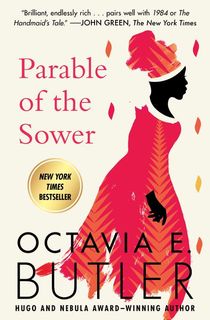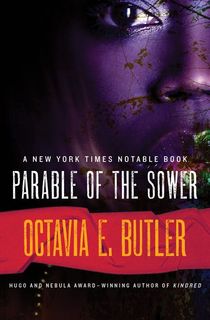When Octavia Butler penned Parable of the Sower in 1993, the story's setting—sometime in the 2020s—seemed quite far off. Now, it's just around the corner.
In the novel, Lauren Olamina and her family live just outside Los Angeles in a community sealed off from the rest of the world, hiding from a desolate post-apocalyptic wasteland. Their community is one of the few safe spaces left in the country.
Inside these walls, her father is a preacher. He’s trying to restore their community to what it once was, after having been stripped of their cultural identities years before. Aside from this, Lauren is not a normal girl. She is dealing with a condition known as "hyperempathy," which means she can feel the pain and other emotions of those around her.
And when tragedy strikes, a fire destroys the compound and Lauren’s family is killed. Now, with a small group of survivors, she is forced out into an unfamiliar world riddled with unfathomable dangers. There, she attempts to establish a new belief system...one that will take her beyond anything she's ever known.
Brilliant and terrifying, Octavia Butler’s Parable of the Sower, which was nominated for a Nebula Award and chosen as a New York Times Notable Book, takes the familiar and turns it on its head. If you're eager to continue Lauren's story, Butler penned a sequel: Parable of the Talents.
Read on for an excerpt of Parable of the Sower, and then download the book.
A victim of God may,
Through learning adaption,
Become a partner of God,
A victim of God may,
Through forethought and planning,
Become a shaper of God.
Or a victim of God may,
Through shortsightedness and fear,
Remain God’s victim,
God’s plaything,
God’s prey.
EARTHSEED: THE BOOKS OF THE LIVING
Saturday, February 1, 2025
We had a fire today. People worry so much about fire, but the little kids will play with it if they can. We were lucky with this fire. Amy Dunn, three years old, managed to start it in her family’s garage.
Once the fire began to crawl up the wall, Amy got scared and ran into the house. She knew she had done something bad, so she didn’t tell anyone. She hid under her grandmother’s bed.
Out back, the dry wood of the garage burned fast and hot. Robin Baiter saw the smoke and rang the emergency bell on the island in our street. Robin’s only ten, but she’s a bright little kid—one of my stepmother’s star students. She keeps her head. If she hadn’t alerted people as soon as she saw the smoke, the fire could have spread.
I heard the bell and ran out like everyone else to see what was wrong. The Dunns live across the street from us, so I couldn’t miss the smoke.
The fire plan worked the way it was supposed to. The adult men and women put the fire out with garden hoses, shovels, wet towels and blankets. Those without hoses beat at the edges of the fire and smothered them with dirt. Kids my age helped out where we were needed and put out any new fires started by flying embers. We brought buckets to fill with water, and shovels, blankets, and towels of our own. There were a lot of us, and we kept our eyes open. The very old people watched the little kids and kept them out of the way and out of trouble.
No one missed Amy. No one had seen her in the Dunn back yard, so no one thought about her. Her grandmother found her much later and got the truth out of her.
The garage was a total loss. Edwin Dunn salvaged some of his garden and carpentry equipment, but not much. The grapefruit tree next to the garage and the two peach trees behind it were half-burned, too, but they might survive. The carrot, squash, collard, and potato plants were a trampled mess.
Of course, no one called the fire department. No one would take on fire service fees just to save an unoccupied garage. Most of our households couldn’t afford another big bill, anyway. The water wasted on putting out the fire was going to be hard enough to pay for.
What will happen, I wonder, to poor little Amy Dunn. No one cares about her. Her family feeds her and, now and then, cleans her up, but they don’t love her or even like her. Her mother Tracy is only a year older than I am. She was 13 when Amy was born. She was 12 when her 27-year-old uncle who had been raping her for years managed to make her pregnant.
Problem: Uncle Derek was a big, blond, handsome guy, funny and bright and well-liked. Tracy was, is, dull and homely, sulky and dirty-looking. Even when she’s clean, she looks splotchy, dirty. Some of her problems might have come from being raped by Uncle Derek for years. Uncle Derek was Tracy’s mother’s youngest brother, her favorite brother, but when people realized what he had been doing, the neighborhood men got together and suggested he go live somewhere else. People didn’t want him around their daughters. Irrational as usual, Tracy’s mother blamed Tracy for his exile, and for her own embarrassment. Not many girls in the neighborhood have babies before they drag some boy to my father and have him unite them in holy matrimony. But there was no one to marry Tracy, and no money for prenatal care or an abortion. And poor Amy, as she grew, looked more and more like Tracy: scrawny and splotchy with sparse, stringy hair. I don’t think she’ll ever be pretty.
Tracy’s maternal instincts didn’t kick in, and I doubt that her mother Christmas Dunn has any. The Dunn family has a reputation for craziness. There are sixteen of them living in the Dunn house, and at least a third are nuts. Amy isn’t crazy, though. Not yet. She’s neglected and lonely, and ike any little kid left on her own too much, she finds ways to amuse herself.
I’ve never seen anyone hit Amy or curse her or anything like that. The Dunns do care what people think of them. But no one pays any attention to her, either. She spends most of her time playing alone in the dirt. She also eats the dirt and whatever she finds in it, including bugs. But not long ago, just out of curiosity, I took her to our house, sponged her off, taught her the alphabet, and showed her how to write her name. She loved it. She’s got a hungry, able little mind, and she loves attention.
Tonight I asked Cory if Amy could start school early. Cory doesn’t take kids until they’re five or close to five, but she said she’d let Amy in if I would take charge of her. I expected that, though I don’t like it. I help with the five and six year olds, anyway. I’ve been taking care of little kids since I was one, and I’m tired of it. I think, though, that if someone doesn’t help Amy now, someday she’ll do something a lot worse than burning down her family’s garage.
Wednesday, February 19, 2025
Some cousins of old Mrs. Sims have inherited her house. They’re lucky there’s still a house to inherit. If it weren’t for our wall, the house would have been gutted, taken over by squatters, or torched as soon as it was empty. As it was, all people did was take back things they had given to Mrs. Sims after she was robbed, and take whatever food she had in the house. No sense letting it rot. We didn’t take her furniture or her rugs or her appliances. We could have, but we didn’t. We aren’t thieves.
Wardell Parrish and Rosalee Payne think otherwise. They’re both small, rust-brown, sour-looking people like Mrs. Sims. They’re the children of a first cousin that Mrs. Sims had managed to keep contact and good relations with. He’s a widower twice over, no kids, and she’s been widowed once, seven kids.
They’re not only brother and sister, but twins. Maybe that helps them get along with each other. They damn sure won’t get along with anyone else.
They’re moving in today. They’ve been here a couple of times before to look the place over, and I guess they must have liked it better than their parents’ house. They shared that with 18 other people. I was busy in the den with my class of younger school kids, so I didn’t meet them until today, though I’ve heard Dad talking to them—heard them sit in our living room and insinuate that we had cleaned out Mrs. Sims house before they arrived.
Dad kept his temper. “You know she was robbed during the month before she died,” he said. “You can check with the police about that—if you haven’t already. Since then the community has protected the house. We haven’t used it or stripped it. If you choose to live among us, you should understand that. We help each other, and we don’t steal. I wouldn’t expect you to say you did,” Wardell Parrish muttered.
His sister jumped in before he could say more. “We’re not accusing anyone of anything,” she lied. “We just wondered. … We knew Cousin Marjorie had some nice things—jewelry that she inherited from her mother. … Very valuable. …”
“Check with the police,” my father said.
“Well, yes, I know, but. …”
“This is a small community,” my father said. “We all know each other here. We depend on each other.”
There was a silence. Perhaps the twins were getting the message.
“We’re not very social,” Wardell Parrish said. “We mind our own business.”
Again his sister jumped in before he could go on. “I’m sure everything will be all right,” she said. “I’m sure we’ll get along fine.”
I didn’t like them when I heard them. I liked them even less when I met them. They look at us as though we smell and they don’t. Of course, it doesn’t matter whether I like them or not. There are other people in the neighborhood whom I don’t like. But I don’t trust the Payne-Parrishes. The kids seem all right, but the adults. … I wouldn’t want to have to depend on them. Not even for little things.
Payne and Parrish. What perfect names they have.
Want to keep reading? Download Parable of the Sower now.
This post is sponsored by Open Road Media. Thank you for supporting our partners, who make it possible for The Portalist to continue publishing the out-of-this-world stories you love.


